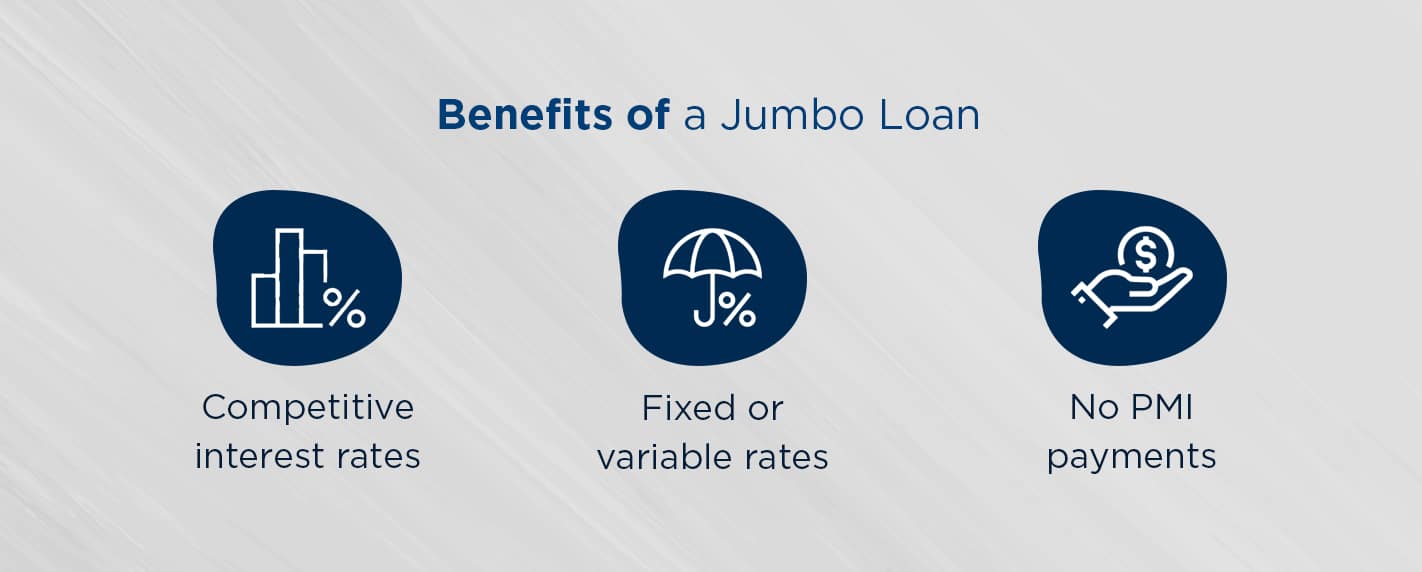Jumbo Loan: Financing Options for High-Value Feature
Wiki Article
Discovering the Advantages and Qualities of Jumbo Loans for Your Following Home Purchase Choice
As the property market develops, comprehending the ins and outs of jumbo financings becomes progressively pertinent for potential homebuyers thinking about high-value residential or commercial properties. These car loans not just assist in substantial funding but also provide numerous advantages, such as competitive rate of interest and the prospective elimination of personal home mortgage insurance. However, the course to securing a big funding is stuffed with certain qualification standards that may test some customers. To totally value just how jumbo car loans can influence your home acquisition approach, it is vital to explore their essential features and benefits in greater information.What Is a Jumbo Loan?

Jumbo loans are usually utilized by customers looking for to purchase high-value homes or homes in expensive markets. jumbo loan. Given the larger quantities obtained, loan providers generally enforce more stringent credit history demands, consisting of greater credit report, reduced debt-to-income ratios, and bigger down payments. The rates of interest on big financings might be somewhat greater than those on adapting car loans, mirroring the increased danger for lending institutions
In addition, the approval process for a big car loan can be more time-consuming and intricate, as loan providers call for comprehensive documents to evaluate the borrower's financial stability. Recognizing these nuances is vital for prospective home owners thinking about a big car loan for their residential property funding needs.
Key Advantages of Jumbo Car Loans
One substantial benefit of jumbo fundings is their ability to finance higher-priced buildings that exceed conforming financing limits. This function makes them an appealing alternative for purchasers aiming to buy deluxe homes or homes in high-cost areas where rates typically surpass standard car loan thresholds.Furthermore, jumbo loans frequently feature flexible terms and competitive rate of interest prices, permitting customers to tailor their funding to match their distinct financial scenarios. jumbo loan. This versatility can consist of alternatives for variable-rate mortgages (ARMs) or fixed-rate lendings, supplying purchasers with the ability to handle their monthly settlements according to their choices
One more advantage is that jumbo loans do not need personal mortgage insurance coverage (PMI), which can dramatically lower the overall price of the financing. With PMI typically being a considerable cost for traditional car loans with low deposits, avoiding it can cause substantial savings over time.
Moreover, customers of jumbo lendings typically have accessibility to greater car loan quantities, allowing them to invest in homes that satisfy their way of life needs. This gain access to encourages customers to act emphatically in affordable realty markets, securing their preferred homes better. Overall, jumbo finances use essential advantages for those looking for to fund premium homes.
Qualification Demands for Jumbo Loans
Jumbo financings come with certain qualification requirements that potential borrowers have to meet to protect financing for high-value residential properties. Unlike conventional financings, which have established limitations based upon the adapting lending limitations established by government-sponsored entities, jumbo financings go beyond these thresholds, necessitating more stringent standards.In addition, jumbo lendings commonly demand a substantial down payment, often varying from 10% to 20% of the acquisition price, depending on the lender's plans and the borrower's financial scenario. Meeting these qualification requirements can place customers favorably in protecting a big financing for their desired residential property.
Contrasting Jumbo Loans to Conventional Car Loans
Recognizing the differences between big car loans and conventional lendings is important for homebuyers navigating the premium real estate market. Big lendings surpass the adhering finance limitations established by the Federal Real Estate Financing Agency (FHFA), which suggests they are not qualified for acquisition by Fannie Mae or Freddie Mac. This leads to different underwriting requirements and needs for borrowers.In comparison, traditional fundings generally follow these limitations, permitting for a more streamlined approval procedure. Jumbo financings usually need stricter credit rating, bigger down payments, and greater financial books. While a standard lending could require a down click for info settlement of as little as 3% to 5%, jumbo finances typically demand a minimum of 10% to 20%.
Rate of interest on jumbo finances may vary from those of conventional fundings, typically being somewhat greater due to the enhanced danger loan providers assume - jumbo loan. The capacity for substantial financing can be beneficial for customers seeking high-end homes. Eventually, recognizing these distinctions enables homebuyers to make informed decisions, straightening their financing choices with their one-of-a-kind getting needs and economic circumstances
Tips for Safeguarding a Jumbo Lending
Protecting a jumbo car loan calls for mindful planning and preparation, as lenders usually impose more stringent requirements compared to standard finances. To boost your opportunities of approval, begin by inspecting your credit history and addressing any kind of issues. A rating of 700 or higher is typically preferred, as it shows creditworthiness.Following, collect your economic documentation, including income directory tax return, W-2s, and financial institution statements. Lenders usually call for extensive proof of earnings and possessions to assess your ability to pay back the car loan. Keeping a low debt-to-income (DTI) ratio is likewise critical; purpose for a DTI listed below 43% to boost your application's competition.
Additionally, take into consideration making a larger down payment. Several lenders look for at the very least 20% down for big car loans, which not just lowers your car loan amount but also signals monetary stability. Engaging with an experienced home loan broker can give indispensable insights into the process and aid you navigate various lending institution options.

Final Thought
In summary, jumbo lendings present substantial advantages for homebuyers seeking buildings that exceed traditional funding limitations. Thorough understanding of both the benefits and needs associated with jumbo finances is crucial for making notified home acquisition decisions in a competitive genuine estate market.The passion rates on jumbo financings might be somewhat greater than those on adjusting fundings, showing the boosted danger for lenders.
While a conventional car loan may need a down payment of as little as 3% to 5%, big finances usually require a minimum of 10% to 20%.
Interest prices on jumbo fundings may differ from those of traditional fundings, typically being a little higher due to the increased threat loan providers assume.Securing a jumbo financing calls for mindful preparation and prep work, as lending institutions typically impose more stringent requirements contrasted to conventional lendings. Several lenders seek at least 20% down for jumbo finances, which not just lowers your funding quantity yet additionally signals economic security.
Report this wiki page